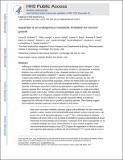Aspartate is an endogenous metabolic limitation for tumour growth
Author(s)
Sullivan, Lucas B.; Luengo, Alba; Danai, Laura V.; Bush, Lauren N.; Diehl, Frances F.; Hosios, Aaron M.; Lau, Allison N.; Elmiligy, Sarah; Lewis, Caroline A.; Vander Heiden, Matthew G.; ... Show more Show less
DownloadAccepted version (801.2Kb)
Terms of use
Metadata
Show full item recordAbstract
Defining the metabolic limitations of tumour growth will help to develop cancer therapies 1 . Cancer cells proliferate slower in tumours than in standard culture conditions, indicating that a metabolic limitation may restrict cell proliferation in vivo. Aspartate synthesis can limit cancer cell proliferation when respiration is impaired 2-4 ; however, whether acquiring aspartate is endogenously limiting for tumour growth is unknown. We confirm that aspartate has poor cell permeability, which prevents environmental acquisition, whereas the related amino acid asparagine is available to cells in tumours, but cancer cells lack asparaginase activity to convert asparagine to aspartate. Heterologous expression of guinea pig asparaginase 1 (gpASNase1), an enzyme that produces aspartate from asparagine 5 , confers the ability to use asparagine to supply intracellular aspartate to cancer cells in vivo. Tumours expressing gpASNase1 grow at a faster rate, indicating that aspartate acquisition is an endogenous metabolic limitation for the growth of some tumours. Tumours expressing gpASNase1 are also refractory to the growth suppressive effects of metformin, suggesting that metformin inhibits tumour growth by depleting aspartate. These findings suggest that therapeutic aspartate suppression could be effective to treat cancer.
Date issued
2018-06-25Department
Whitehead Institute for Biomedical Research; Massachusetts Institute of Technology. Department of Biology; Koch Institute for Integrative Cancer Research at MITJournal
Nature cell biology
Publisher
Springer Science and Business Media LLC
Citation
Sullivan, Lucas B. et al. “Aspartate is an endogenous metabolic limitatio for tumour growth.” Nature cell biology 20 (2018): 782-788 © 2018 The Author(s)
Version: Author's final manuscript
ISSN
1465-7392
1476-4679
Keywords
Cell Biology